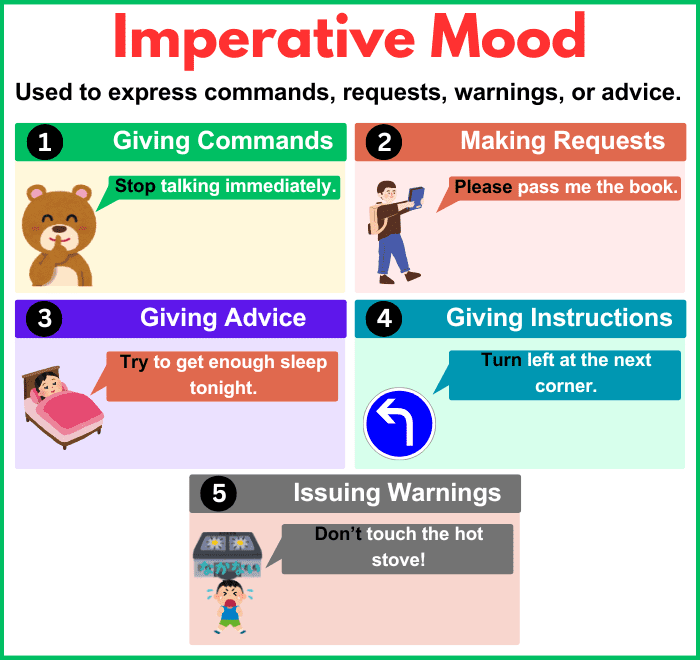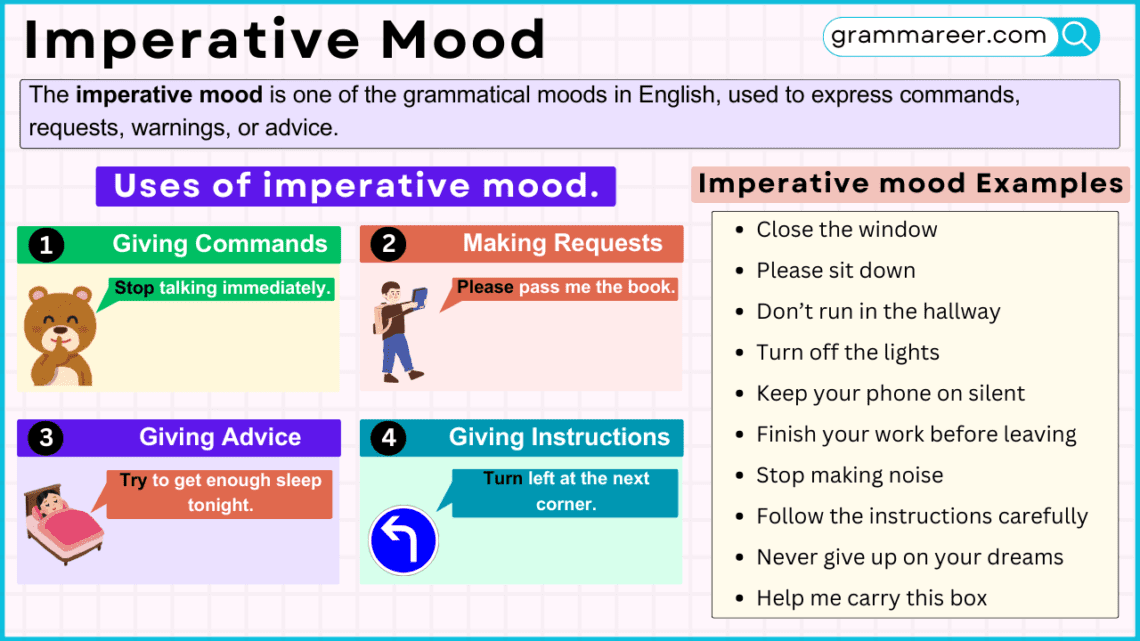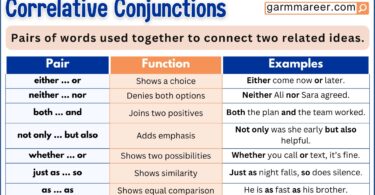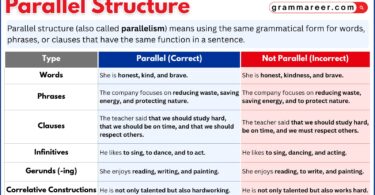The imperative mood is a grammatical term that describes the form of a verb used to give commands, make requests, offer advice, or issue instructions. It is a key concept in English grammar and plays an essential role in everyday communication. By mastering the imperative mood, learners can clearly and effectively convey direct actions, advice, or requests.
The imperative mood is one of the grammatical moods in English, used to express commands, requests, warnings, or advice.
Pray regularly to stay focused.
Table of Contents
How to Form the Imperative Mood
It is formed by using the base form of the verb. It does not require a subject, as the subject “you” is implied. The structure is straightforward:
Base form of the verb: Start with the verb directly.
- Listen to the teacher attentively.
Negative form: Use “do not” or “don’t” before the base verb for negative commands.
- Don’t interrupt while others are speaking.
Uses of the Imperative Mood
Giving Commands
Commands are direct orders or instructions, often used in authoritative or urgent situations.
Examples:
- Close the door immediately.
This is a direct order to take immediate action.
- Start writing your essay now.
This emphasizes the urgency of beginning the task.
- Stop arguing and focus on the problem.
This demands an immediate cessation of an activity.
Making Requests
Requests soften the tone of the imperative mood, making it more polite.
Examples:
- Please pass me the Quran.
This politely asks someone to perform an action.
- Kindly bring me a glass of water.
This makes a polite appeal for assistance.
- Help your sister with her project.
This asks for help in a softer tone.
Offering Suggestions or Advice
It can be used to guide or advise someone.
Examples:
- Consider revising your notes before the exam.
- Think carefully before making a decision.
- Try to be more punctual in the future.
Giving Instructions
It can be used to provide step-by-step guidance (instructions).
Examples:
- Turn on the computer and click on the login icon.
- Mix the flour and water until smooth.
- Insert the key and turn it clockwise to unlock the door.
Issuing Warnings
Warnings alert someone to potential danger or consequences.
Examples:
- Beware of stray dogs in this area.
- Do not touch the electric wires.
- Watch out for slippery floors.
Examples List of the Imperative Mood
Here are the examples list with explanation:
| Imperative Sentence | Explanation |
|---|---|
| Stay humble in every situation. | Advises maintaining humility. |
| Don’t forget to pray on time. | Warns against neglecting prayers. |
| Help your brother with his homework. | Commands an act of assistance. |
| Please, be mindful of your tone. | Requests attention to one’s manner of speaking. |
| Take the second right at the signal. | Provides directional guidance. |
| Speak respectfully to your parents. | Advises proper behavior in communication. |
| Do not delay in fulfilling your obligations. | Warns against procrastination. |
| Submit your assignment before the deadline. | Commands timely action. |
| Follow the rules of the library. | Gives clear guidance for behavior. |
| Read the instructions before proceeding. | Advises careful preparation. |
Difference Between Imperative and Indicative Mood
Both moods of the verb serve different functions in English grammar. The table below highlights the differences:
| Imperative Mood | Indicative Mood |
| Gives commands, requests, or instructions. | States facts, opinions, or asks questions. |
| Subject is often implied (you). | Subject is explicitly stated. |
| Perform wudu before prayer. | Zain is reading a book. |
| Do not enter the mosque with shoes. | Are you attending the class? |
Why the Imperative Mood Is Important
The imperative mood is vital for effective communication. It simplifies interactions by providing clear instructions, whether in formal settings like classrooms or informal conversations with friends and family. Understanding and using this mood correctly ensures clarity and precision in expressing intentions or actions.
FAQs
The imperative mood is used to give commands, instructions, requests, or advice.
Close the door.
To form the imperative mood, use the base form of the verb. For negative sentences, add “do not” or “don’t” before the verb. For example, “Read the instructions carefully” or “Don’t skip your lessons.”
Perform your Salah daily.
Don’t delay important tasks.
Help your sister with her project.
Commands are direct and authoritative, while requests are polite and may include words like “please” to soften the tone. For instance, “Stop talking” is a command, whereas “Please listen” is a request.
Conclusion
Mastering the imperative mood is essential for clear and concise communication. Whether you are giving instructions, making polite requests, or offering advice, the imperative mood simplifies and enhances interactions. By practicing its formation and usage, learners can confidently express themselves in various situations.
You May Also Like




